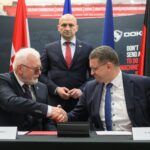ZAGREB, February 5, 2019 – Greece will always be on Croatia’s side, as it showed during Croatia’s accession to the European Union and to NATO, and it will show its support for Croatia’s entry into the Schengen and euro zones too, the President of Greece, Prokopis Pavlopoulos, said on Tuesday after meeting in Zagreb with his Croatian counterpart President Kolinda Grabar-Kitarović.
Croatia needs the support of all EU member states for its accession to both zones. Slovenia’s officials have hinted that Ljubljana might block Croatia’s entry to Schengen due to the unresolved border dispute.
President Grabar-Kitarović said that “Croatia is investing a lot of effort to protect the EU’s external borders and, once it joins the Schengen Area, it will do that even more effectively and will significantly contribute to the EU’s overall security.”
She added that Zagreb appreciates Greece’s role in managing the migrant crisis as the first guard of the European borders.
“The Western Balkan route is still closed, but we call for constant caution because of the migrant pressure on that route,” she warned and underscored that it was necessary to work on resolving the fundamental causes of migrations.
President Pavlopoulos hopes that 2020 will be important for Croatia’s accession to the euro zone, as Croatia will chair the European Union in the first half of the year. Croatian Prime Minister Andrej Plenković has on several occasions announced that year as the year to introduce the euro in Croatia which is a legal obligation for all EU member states, with the exception of Denmark and Great Britain.
“We are here to help governments in our countries that will decide on that. We advocate that our countries cooperate better at the economic and other levels,” Pavlopoulos said. In Greece, the president’s role is ceremonial.
Speaking about economic cooperation between the two countries, Grabar-Kitarović underscored that it was fairly modest with regard to trade and investments. “Investments are very low. Croatian investments in Greece are almost non-existent and Greece is, unfortunately, not among the 40 top investors in Croatia,” she said.
Croatia’s most exported commodity to Greece is sugar, iron and steel products, textile products, fertilisers and medicines, while Greece’s exports to Croatia include citrus fruits, textile products and aluminium products.
Grabar-Kitarović sees potential for further cooperation in strengthening ties in tourism, maritime and land transport, establishing direct flights between Croatian and Greek cities, and many other areas.
She recalled that Croatia is a signatory to the memorandum of understanding with Albania and Montenegro for the construction of the Adriatic-Ionian gas pipeline that will connect to the pipeline currently under construction in Greece.
The two heads of state support the completion of the Adriatic-Ionian transport route which would connect their two seas and Croatian and Greek ports.
Pavlopoulos said Athens and Zagreb, “because of the vision of its fathers”, had the duty to support the further unification of Europe and, together with Romania and Bulgaria, build the EU’s southeast pillar.
He said all neighbouring countries must join the EU because “the bigger it is, the better for it as well as for the whole world,” but first they must meet requirements such as the rule of law and the adoption of the acquis.
He also spoke of North Macedonia, the state which, as of January, has a new name after the Greek and Macedonian parliaments adopted a historic agreement to that effect.
“We Greeks are here to help it on the path to NATO and the EU, but also to convince it that, without respecting the law and eradicating any irredentism, it can’t make progress on that path,” Pavlopoulos said, adding that the same applied to Albania.
He said the EU must be built on the federal principle and that it was a union of people, but with a global role which other world powers should have too.
“There is no other power in the world that can better push for peace, humanism, democracy and the law. We must defend our peoples as well as all of humanity in this delicate period,” he said, referring to European elections in May at which populist parties are expected to rise in popularity.
“Skeletons of the past are being awakened. We must take action to resist those threats. Europe was built on the rubble of World War II and we must fight so that something like that doesn’t happen ever again,” Pavlopoulos said.
He said his next meeting with Grabar-Kitarović would take place in October.
Grabar-Kitarovic spoke of the historical links between the two countries. “The Aegean and the Adriatic Seas have linked us for millennia and traces of ancient Greek culture are visible in Dalmatia, on several Croatian islands, including in the northern Adriatic, where Lošinj has one of the most beautiful and well-preserved Apoxyomenos sculptures.”
She said many Croats of Greek descent had left a strong mark in Croatia, including 19th century dramatist Dimitrije Demeter and 20th century composer Boris Papandopulo.
Pavlopoulos is staying in Croatia two days and will also meet with Parliament Speaker Gordan Jandroković and Prime Minister Andrej Plenković.
More news on the relations between Croatia and Greece can be found in the Politics section.







